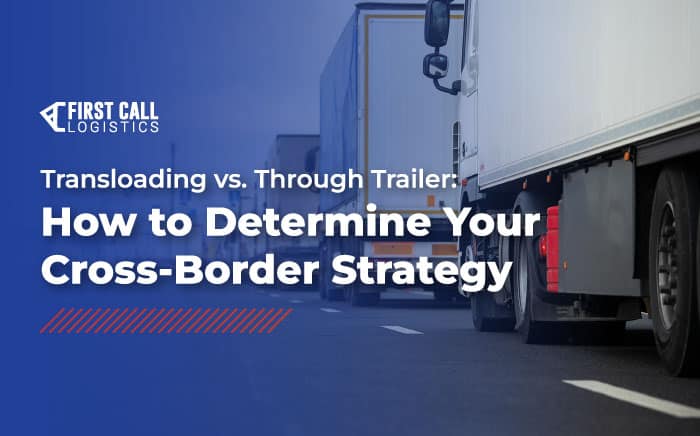Transloading vs. Through-Trailer: How to Determine Your Cross-Border Strategy

The need for fast international shipping can (and should) feel like a major win for a blooming business. As the excitement surrounding your operation grows, it’s important to understand in simple terms the two main methods of trucking available to companies aiming to take their goods abroad.
Why is Transloading Often Linked to Cross-Border Shipments?
Shipping truckloads of goods between the United States and its neighboring countries takes one of two approaches. Shipping via through-trailer (also termed “direct trailer”) is considered the “door to door” method, defined by cargo kept on one continuous trailer throughout the life of the shipment. Alternatively, transloading removes cargo from its initial trailer in favor of a new one at the border.
Operationally, both approaches hinge on pairing a U.S.-based driver and tractor with a Canada or Mexico-based counterpart, as regulations require each to run only on their respective side of the border.
Which Method Keeps the Truck’s Security Seal Intact?
Customs officials are authorized to break a truck’s security seal and evaluate a shipment’s cargo upon its arrival at the border, to carefully document the condition and contents of each trailer before approving its crossing. This is a regular occurrence and applies to both transloaded and through-trailer shipments.
When Should I Use Through-Trailer?
While palletized freight can technically cross the border via through-trailer, hand-loaded cargo is the most common use case for direct shipments. Through-trailer shipping is also better suited for cases where the transloading process might require special equipment, which tends to be either unavailable at the border or extremely costly.
Don’t forget — excessive handling throughout the shipping process raises the risk of damaged freight.
When Should I Use Transloading?
Palletized or otherwise difficult-to-load freight naturally lends itself to transloading, both for its cost-efficiency and the added benefits afforded by the mandatory product check at the border. Particularly when transporting freight prone to shifting in transit, this check presents an opportunity to restack or reorganize palletized cargo. If damage is discovered, the product can be returned to the shipper more quickly (and more economically).
Transloading also opens the door to additional network options, as carriers can utilize one another’s trailers without the hassle of interchange agreements.
First Call executes both through-trailer and transload business for a varied customer base, pairing our experience in cross-border routes and strategies with a thorough customer discovery process to provide the best possible service to our partners. Set up a call with us today to meet the First Call team and get started!
Simplify your Next Cross-Border Shipment with First Call Logistics
More Cross-Border Shipping Resources:
Get the latest supply chain news and updates directly to your inbox.